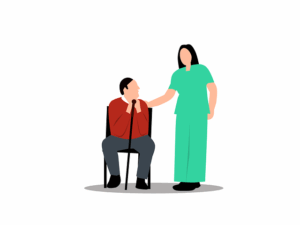What Is Willful Deprivation, and How Does It Happen in Nursing Homes?
Willful deprivation in a nursing home happens when residents are deliberately denied basic needs. It can result in pain, illness, and even death.
And sadly, it happens far more often than you might think.
As a Memphis nursing home abuse lawyer, I want to help you understand what willful deprivation is, how to recognize it, and what legal options are available if it happens to someone you care about.
What Does “Willful Deprivation” Mean?
Willful deprivation happens when a caregiver intentionally denies a resident the things they need for their health and well-being.
This can include:
- Food or water
- Medication or medical treatment
- Personal hygiene care
- Use of mobility aids, like walkers or wheelchairs
- Help getting to the bathroom
- Emotional support or social interaction
Unlike accidental neglect, willful deprivation is deliberate. It’s a choice made by someone in charge of care, and it’s often done as a form of punishment, control, or simply because the facility is understaffed and failing to meet legal standards.
 Why It Happens
Why It Happens
There’s no excuse for willful deprivation. But there are certain situations that make it more likely to happen. This specific type of abuse often comes up in:
- Understaffed facilities, where workers cut corners
- Poorly managed nursing homes with a pattern of violations
- Toxic environments, where residents are treated more like burdens than people
- Situations involving residents with dementia or disabilities, who may be less able to speak up or report abuse
Problematic staff members may isolate a resident as “discipline,” withhold food to control behavior, or refuse to assist with basic hygiene because they don’t want to deal with it.
In all of these cases, the staff member is responsible for their own abusive actions. But the facility often has warning signs and/or could have taken preventative measures long before it gets to the point of abuse.
Signs of Willful Deprivation
Because willful deprivation happens to people at their most vulnerable, your loved one may not be able or willing to tell you what’s happening.
That’s why it’s important to know the warning signs:
- Rapid weight loss or dehydration
- Bedsores or infections from being left in bed too long
- Unexplained declines in health
- Dirty clothes or poor hygiene
- Missed medications or untreated symptoms
- Fear, anxiety, or depression
- Crying out for help or being unusually withdrawn
With any of the above, trust your instincts. If something seems off, it’s worth looking into.
 What to Do If You Suspect Willful Deprivation
What to Do If You Suspect Willful Deprivation
First, talk to your loved one, as they’re able. Ask direct but gentle questions. If they’re hesitant or confused, note their tone and body language.
You’ll also want to document everything. Write down what you observe and take photos if possible. Keep records of medications, weight changes, and complaints.
From there, you can and should report signs of abuse. You should file a complaint with the facility’s administration and contact the Tennessee Department of Health or Adult Protective Services.
Last of all, contact a lawyer. Willful deprivation is not only immoral – it’s illegal. You may have grounds for a lawsuit to recover damages and hold the facility accountable.
 You’re Not Alone
You’re Not Alone
If your loved one has suffered from willful deprivation, you are not powerless. As a Memphis lawyer who fights for victims of nursing home abuse, I’m here to listen, investigate, and take action. We can help protect your loved one and prevent others from going through the same harm.
We’ve gone up against some of the most abusive facilities in the country, and won. We fight for justice on your behalf and to put a stop to abusive practices in the future.
And we don’t make anything unless and until we win your case.
If you suspect abuse against your loved one, don’t wait. Reach out today to schedule a free consultation. Your loved one deserves better, and we’re here to help make that happen.

